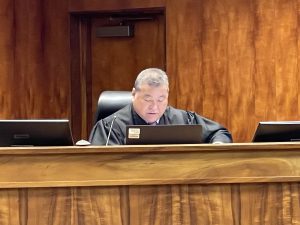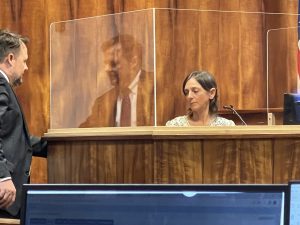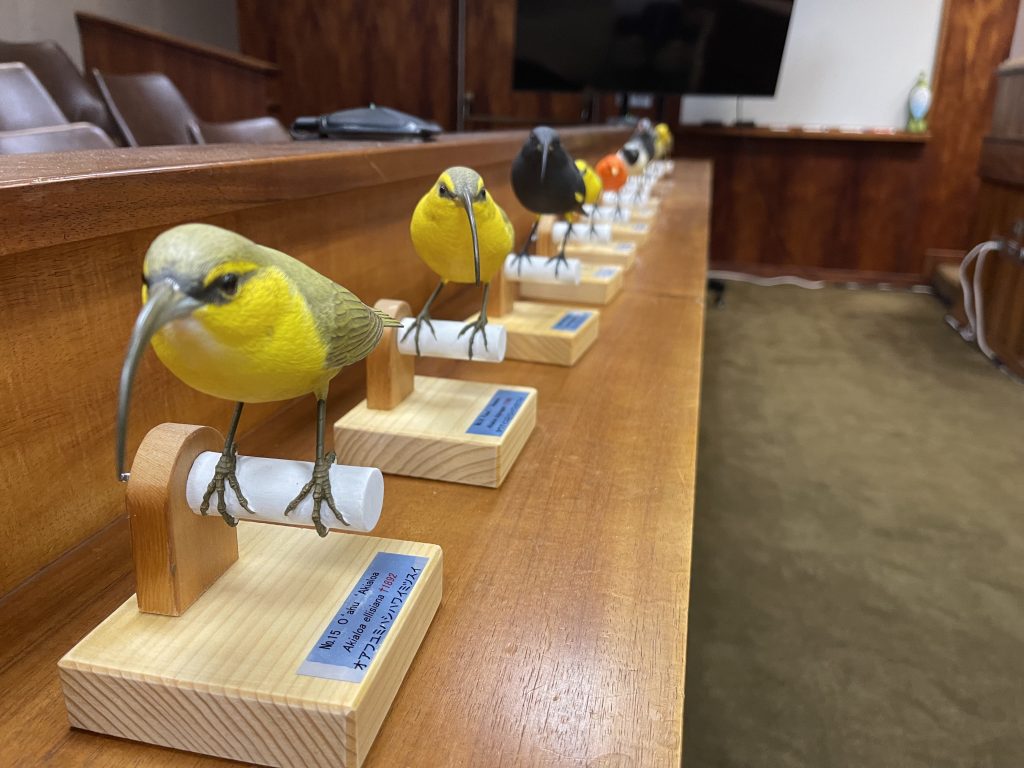02/06/24 – JUDGE’S RULING GIVES HAWAI‘I’S ENDANGERED BIRDS A CHANCE FOR SURVIVAL
Posted on Feb 6, 2024 in Forestry & Wildlife, News Releases, slider
| JOSH GREEN, M.D. GOVERNOR |
DAWN CHANG
CHAIRPERSON |
(HONOLULU) – First Circuit Court Judge John M. Tonaki has ruled in favor of the DLNR and American Bird Conservancy (ABC), represented by the Center for Biological Diversity, in granting summary judgment and finding the Environmental Assessment prepared for using the Incompatible Insect Technique (IIT) to control mosquito born avian malaria on east Maui was sufficient.
The disease already led to the extinction of many native birds and is responsible for nearly wiping out several remaining species of Hawaiian honeycreepers, so that these birds are on the verge of extinction in the wild.
verge of extinction in the wild.
In approving a Motion for Summary Judgment, Tonaki observed, “In an effort to save Hawaiian birds which are in danger of extinction, the State of Hawai‘i Department of Land and Natural Resources seeks to undertake a project that aims to suppress mosquito populations carrying avian malaria.”
Last March, the state Board of Land and Natural Resources (BLNR) approved a final environmental assessment (FEA) for implementation of the IIT project in east Maui and found it had no significant impact (FONSI).
The plaintiff filed a claim saying the BLNR erroneously accepted the FEA and erroneously issued a FONSI.
In his order Judge Tonaki wrote, “A reading of the FEA reveals that many of the alleged issues raised by Plaintiff, were, in fact, addressed in the FEA and that some of the potential impacts of the project were raised as mere possibilities…There is no genuine issue of material fact relating to whether the DLNR and BLNR complied with the requirements under the Hawai‘i Environmental Policy Act (HEPA).”
DLNR/BLNR Chair Dawn Chang said, “This is a victory for our endangered forest birds who some native Hawaiians consider their ancestors. Historically, mosquitoes were absent from higher elevations due to cooler temperatures. However, climate change has warmed these elevations which now provides favorable conditions for mosquitos to spread avian malaria to this vulnerable bird species. IIT is the most effective and safe technique available for controlling mosquito populations and has been used successfully around the world, as our experts testified during the hearings last summer. The HEPA is an important tool that enables decisionmakers to assess environmental impacts—not the sword by which misinformation kills a project, aimed at saving native species.”
Dr. Chris Farmer, ABC’s Hawai‘i Program Director added, “American Bird Conservancy joined the lawsuit because preventing the extinction of Hawai‘i’s birds due to avian disease and mosquitoes is one of ABC’s highest priorities. ABC and our partners in Birds, Not Mosquitoes (BNM) thoroughly evaluated this effort, and are pleased to see the court also agrees. We strongly believe that this approach is our best chance at preventing bird extinctions on Maui and are excited to continue moving forward with mosquito releases to save kiwikiu, ‘ākohekohe, and other native forest birds.”
Miranda Steed, a deputy attorney general in the Dept. of the Attorney General commented, “The court’s well-reasoned opinion is a win for Hawai‘i’s birds and the rule of law. As the state experiences the ramifications of climate change, such as increased transmission of avian malaria pushing native birds toward extinction, the DLNR/BLNR must be able to act.”
 The U.S. Fish and Wildlife Service is one of the federal partners in the Birds, Not Mosquitos collaboration. Earl Campbell, USFWS Field Supervisor, Pacific Islands Fish and Wildlife Office commented, “This decision is a significant step in ensuring the long-term survival of Hawaiian honeycreepers and the ecological and biocultural role these birds provide for the people of Hawai‘i.”
The U.S. Fish and Wildlife Service is one of the federal partners in the Birds, Not Mosquitos collaboration. Earl Campbell, USFWS Field Supervisor, Pacific Islands Fish and Wildlife Office commented, “This decision is a significant step in ensuring the long-term survival of Hawaiian honeycreepers and the ecological and biocultural role these birds provide for the people of Hawai‘i.”
As the IIT is being deployed on the slopes of Haleakalā, work continues to try and capture as many endangered birds as possible, bring them into conservation breeding centers, and keep them safe, until they can be returned to mosquito-free areas.
“Extinction is forever, but for our last remaining forest birds on Maui, it does not have to be inevitable,” said Maxx Phillips, a Center for Biological Diversity attorney. The Court has made clear that we will not sit back and watch our forests fall silent.”
# # #
RESOURCES
(All images and video courtesy: DLNR)
HD video – IIT TRO hearing (July 21, 2023):
https://vimeo.com/847491877?share=copy
Photographs – IIT TRO hearing (July 21, 2023):
https://www.dropbox.com/scl/fo/llwceye7iykozqeiv0t8k/h?rlkey=5zzqxc15jlg7ace1xiz0d0bgl&dl=0
Media Contact:
Dan Dennison
Communications Director
(808) 587-0396
[email protected]
Reply
Reply all
Forward
